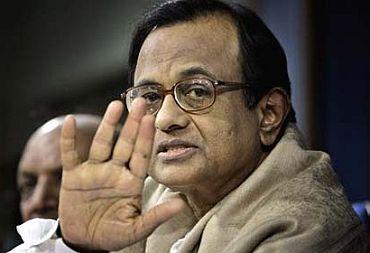Photographs: Reuters Priyanka in New Delhi
Growth and economic reforms in India must take centre-stage again and acts of corruption or security concerns should not distract the attention of the government and the people, said Union Home Minister and former finance minister P Chidambaram recently.
He was addressing members of the Federation of Indian Chambers of Commerce and Industry and journalists at a conference to discuss a paper by senior editor Swaminathan S Anklesaria Aiyar on 20 years of economic reforms in India.
The paper -- The Elephant that became a Tiger: 20 years of Economic Reform in India -- discussed the key achievements of the reforms which were first introduced in 1991.
Chidambaram recalled that there had been the huge stocks scam in 1992 and that scale and impact were far greater than the current 2G scam. Later in the same year, the demolition of Babri Masjid happened, but the government did not distract itself from the main agenda of growth, reform and change, he added.
. . .
Govt must focus on reforms, not let scams distract it: Chidambaram
Photographs: Uttam Ghosh/Rediff.com
Once again, growth and reform must be brought to the fore, said the home minister.
He said that while the reforms were first introduced in 1990-91, the second wave of reforms really started only in 2004. He added that the governments present during this period were not anti-reform, but they did not unleash a 'wave of reforms'.
He cited that the United Progressive Alliance government inherited a number of problems when it came to power in 2004. "There was a mounting fiscal deficit, no assurance of education for all, no concept of dealing with unemployment, no talk of food security, land acquisition was not being handled properly and there was no attempt to work out a political reform agenda for Jammu & Kashmir," he said.
Since then the government has been trying to address these issues, apart from many others. Chidambaram contented that after the Narasimha Rao government, economic reforms in the country got stalled as the succeeding governments did not aggressively push on this agenda.
. . .
Govt must focus on reforms, not let scams distract it: Chidambaram
Photographs: Reuters
As for Swaminathan's paper, it essays the history of economic reforms in India. The paper explains how 'a foreign exchange crisis' in 1990-91 ushered India into an era of economic reforms. The reforms transformed India from 'inward-looking socialism' -- and what analysts would often call a lumbering elephant that could not pick up much speed despite its size -- to becoming an 'Asian tiger'.
Swami elaborates in the paper that critics would often argue that India's experiment with economic reforms will result in 'a lost decade', a consequence that many of the African countries had already faced.
However, 20 years later, most of the critics have been proved wrong. India managed a growth rate of 7.5 per cent from 1994-95 and 1996-97. After dipping briefly to 5.5 per cent in 1997-99, it shot up to an astonishing 9.5 per cent in the period from 2005 to 2008.
It stayed at a healthy 6.8 per cent per year during the global recession years. It is now growing at a rate of 8 per cent per year and is expected to grow by 8.5 per cent in the next year too.
. . .
Govt must focus on reforms, not let scams distract it: Chidambaram
Photographs: Reuters
Also present at the conference was former Union finance and external affairs minister Jaswant Singh. He said that while there was too of much governance earlier, there is too little governance today and this great swing in India captures the essence of what is being going on in the past 20 years.
He said that the government is not deciding and there is an air of uncertainty.
Chidambaram was quick to respond to this remark and said that if his colleague feels that the government has been low on governance; his point of view is respected. But he soon added that it wouldn't have been possible to grow at about 8 per cent annually in the absence of governance.
The home minister also said there were numerous examples of good governance present in the country today. He said Kerala can be seen as an example of good governance on the issue of public distribution system.
. . .
Govt must focus on reforms, not let scams distract it: Chidambaram
Photographs: Reuters
Similarly, Karnataka can be seen as an example of good governance of schools, he said. Maharashtra and Andhra Pradesh are examples of good governance of panchayat raj systems, whereas Punjab and Haryana exhibit good governance in rural infrastructure, Chidambaram added.
However, he added that these examples were still largely localised and there is a need to universalise good governance.
Swami, in the paper, rubbishes claims that growth and development has not reached all sectors of the society evenly or that this was responsible for the bigger 'Maoist insurrection' in many places.
He stated that such claims are mostly exaggerated and in some places plainly untrue. He explains that the 'Maoist insurrection' is an issue of tribal versus non-tribal; poverty is being grafted on to it.
. . .
Govt must focus on reforms, not let scams distract it: Chidambaram
Photographs: Reuters
Swami also lists few of the other achievements of 20 years of reforms in India in his paper. He states that the per capita income has risen from "$300 in 1991 to an estimated $1,700 today."
Over the years, India has pioneered in frugal engineering, a term Swami describes in his paper as being able to "design and produce goods that are not just 10-15 per cent but 50-90 cheaper" as compared to their Western counterparts. Tata's Nano and an upcoming model by Bajaj Auto are apt examples in this space.
When India opened up to economic reforms 20 years ago, many analysts and critics feared that Indian businesses will not be able to survive the advent of foreign investors and MNCs.
Swami argues that many believed that "Indian companies would either go bust or be taken over by multinational corporations." But none of this ever happened. Indian companies and businesses stood their own ground and became "multinational companies in their right," he writes.
. . .
Govt must focus on reforms, not let scams distract it: Chidambaram
Photographs: Reuters
In fact, Indian companies have been fairly successful in buying out foreign enterprises. Tata Motors bought Jaguar-Land Rover which had been running into losses under two of its prior owners, BMW and Ford. Tata Motors turned has now Land Rover into a success.
However, there is still much to be achieved and Swami points it out in the paper that there is an "unfinished agenda" on economic reforms.
India still lags far behind in economic freedom and ranks 124th in the world, according to the 2011 Index of Economic Freedom by The Heritage Foundation.
There is also a shortage of skilled labour. Perhaps, one of the biggest disappointments of the reforms run is that India still has one of the highest number of underweight children, which is also a measure of poverty.
. . .
Govt must focus on reforms, not let scams distract it: Chidambaram
Photographs: Reuters
Concluding his remarks on the 20 years of economic reforms, Chidambaram agreed that the biggest failure is that the pace of removing poverty has been slow. He said that poverty can be removed only if a growth of 8 per cent is sustained. Hence, the focus of the government should be growth, reforms and change.
He said that the goal now is to grow at 8 to 9 per cent in the coming years and remove poverty and unemployment.
Closing his remarks, Chidambaram said that he is not despondent and is quite optimistic that this stage will pass and the virtues of growth and economic reforms will be seen by all.









article